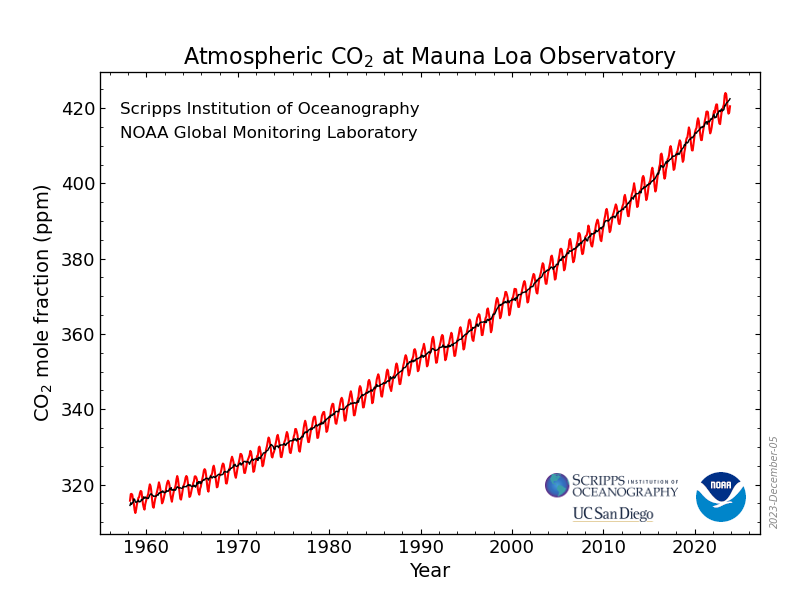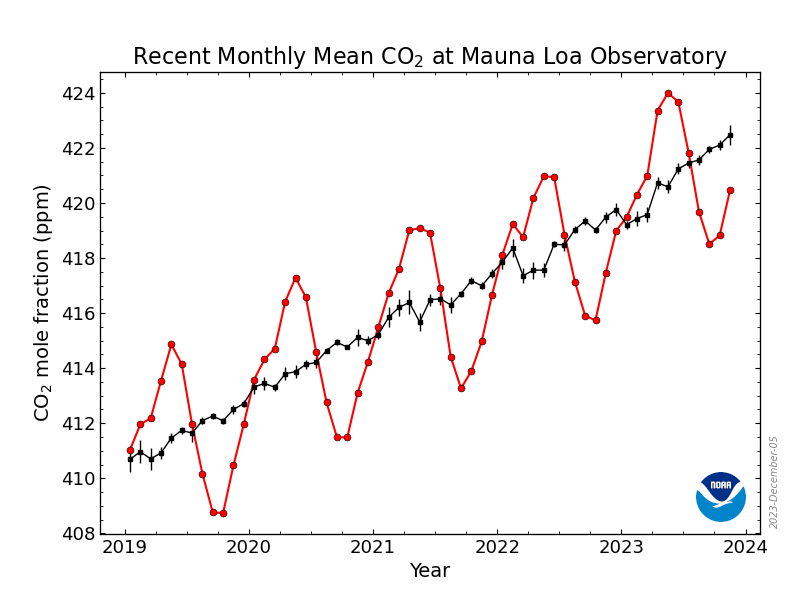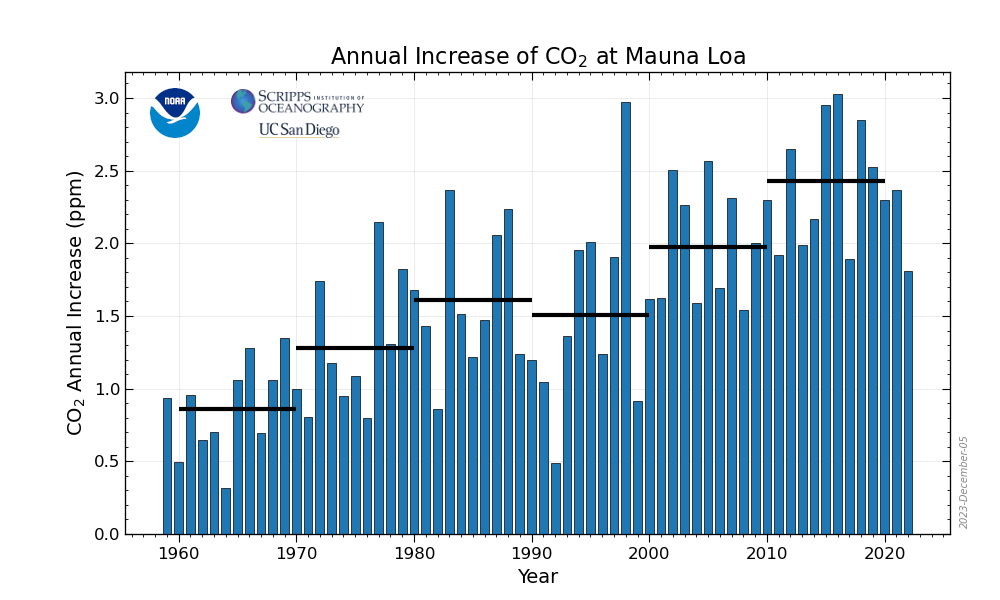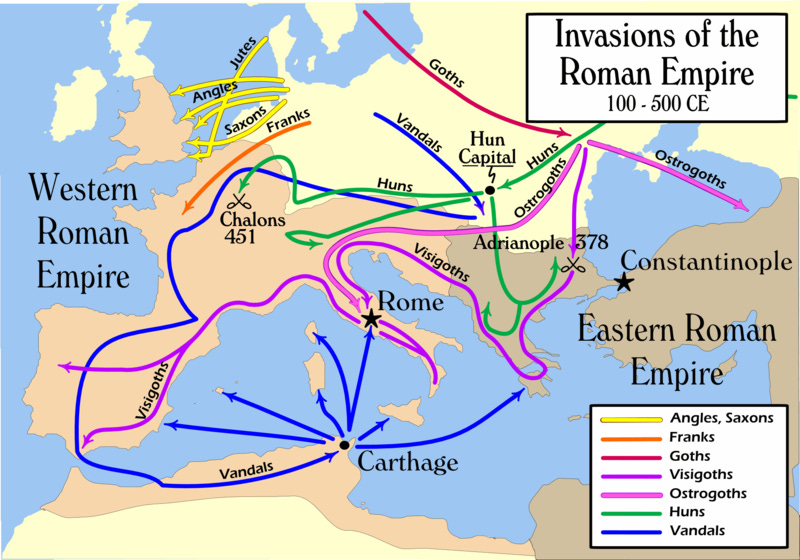Yves here. More sobering realism on the climate front.
By Thomas Neuburger. Originally published at God’s Spies
From James Hansen’s latest version of his latest paper, “Global Warming in the Pipeline,” we find this (emphasis mine):
Consistent analysis of temperature over the full Cenozoic era … implies that CO2 was 300–350 ppm in the Pliocene and about 450 ppm at transition to a nearly ice-free planet, exposing unrealistic lethargy of ice sheet models.
Keep that number — “450 ppm at transition to a nearly ice-free planet” — in mind as you read the following.
CO2 Growth Is Accelerating
First, the latest CO2 data from NOAA monthly averages:

and a close look at recent data:

Note the peak at 424 ppm, and consider again: “Consistent analysis of temperature over the full Cenozoic era [implies] about 450 ppm at transition to a nearly ice-free planet.”
Like global warming itself, the rate of CO2 growth is accelerating. Annual growth is now 2.4°C per year, up from 2°C per year in the previous decade.

CO2 Levels Through 2060
So let’s do the math. Assuming acceleration of annual growth — meaning, the world’s governments never reject fossil fuels — the decade of the 2020s could see CO2 growth of nearly 30 ppm per year; the 2030s, growth above 35 ppm per year; the 2040s, growth near 45 ppm per year; and so on.
That yields CO2 numbers like these:
2030 — 438 ppm (no accel.)
2040 — 463 ppm (no accel.)
2050 — 487 ppm (no accel.)
2030 — 444 ppm (with accel.)
2040 — 479 ppm (with accel.)
2050 — 522 ppm (with accel.)Need we go on?
A ‘Chinese Century’?
That makes even predictions like these optimistic. In a dire thread that starts here, Ian Welsh writes this at the end:
All of this is done in the shadow of climate change and environmental collapse. I expect that by 2080 even China will have dissolved into warlordism.
No one is getting out of this clean.
— Ian Welsh (@iwelsh) December 18, 2023
By the 2080s? I think the nation-splitting chaos will start a lot sooner.

The above took hundreds of years. We’ll see the same, globally, in less than ten once the real crisis takes hold: the scramble for food, for high ground, against disease, and all the regional disasters that threaten integrated global life, like shipping of goods.

Will this generation dodge the bill for its own climate failure? Or pay for its sins itself?
We’re Going To Need Better Leaders
I really do wish people would take this stuff seriously. By “people” I mean people with power.
Barring that, I wish people like us would remove those people-with-power, and pretty darn soon. We’re gonna need better leaders, and pretty darn soon.


I have been doing a deep dive into Jem Bendell’s dense tome on societal collapse: “Breaking Together”. Some friends and I are working on a public forum on societal collapse, although it feels next to impossible to summarize his wide-ranging work. One friend constantly refers to our project as being about global heating and, although that is certainly one factor in societal collapse (and may be beginning to achieve some credance) there are a dozen or more other factors all working in the same negative direction.
Sometimes I feel like Paul Revere, ready to spread the alarm only to find that there is no horse.
But maybe if people begin to mobilize around global heating, they will be more willing to acknowledge and mobilize around the myriad other ways that Capitalism gave us a horribly wrong path to follow. Everyone doesn’t need to work on everything, but each assault on the biosphere needs to have some people dedicated to remedying it.
And leaving it to the experts is part of how we ended up here.
There is a units typo in the original post. It refers to CO2 growth accelerating from 2C to 2.4C.
It must be 2ppm to 2.4ppm
Agree accelerating CO2 (and the others, ch4 etc) means the Jackpot (aka intertwining diasters) is now on its way toward us. Our leaders are the billionaires and their lackeys. Judging by history those in power want to retain power at all costs. Thus it has been convenient for those leaders to ignore and disrupt attempts to prevent the Jackpot. As soon as warnings began to arrive, in the 60s and 70s, that is what happened in public anyway. Remember as long as power relations stay the same a few billions of humans dieing off is no worry to our leaders.
So we can’t look to leaders. Those who want to survive will vote with their feet, their time, energy, resources. Migration is not easy though, even if not crossing borders.
Still, around the same centuries as the collapse of the Roman Empire, a number of multi thousand person underground cities were built in what is today Turkey. Individuals don’t survive. I prefer to not live in a warlord society, so if avoidance is an effective strategy, maybe underground communities in fairly remote locations.
I suggest areas likely to do best in the coming heat catastrophe are higher lattitudes closer to the melting ice caps.
Perhaps small groups of persons living in underground communities, at these latitudes, might survive? Maybe a little like they say monasteries preserved some knowledge from Roman times through the dark ages.
Somewhat scattered comment, but it’s early am here.
With all due respect, the call for better leaders— without changing the underlying political economy, hasn’t worked for the last half-century.
Biden’s IRA (Inflation Reduction Act) illustrates the conundrum. The question it is designed to answer is: what policies can both benefit my (his) donors while convincing his voters that they are the best policies that can be achieved.
The question Biden makes no effort to answer is: what policies are needed to keep the world livable going forward?
This can been seen in how environmental problems are so narrowly defined. Climate crisis is only one aspect of wildly destructive and dysfunctional economic production.
So, is the problem Biden or political economy designed to give the rich de facto control over public policy?
And if it is the latter, as I believe it is, isn’t that the first problem in need of resolution?
Irrespective, thanks to Neuberger for the effort.
Leaders need followers. A poll just out said 37 percent of respondents cited AGW as the number one problem but that’s still not a majority. And the wealthy class cruising around in their private jets don’t seem too concerned about it either (yes you Leo DiCaprio).
Add in that entrenched incumbency has given us a politics of geezers who won’t be around to experience the full brunt of climate change and it’s hardly surprising that not much is being done. Perhaps it’s time for another “youth revolution” to scare the pants off the incumbents. The last time in the 60s it merely inspired them to circle the wagons as described by Michael Hudson yesterday. Gen Z needs to get off their smartphones and become activists.
There is a unit-of-measure error in the article. “Annual growth is now 2.4°C per year, up from 2°C per year in the previous decade” should be “Annual growth is now 2.4 ppm per year, up from 2 ppm per year in the previous decade.” The Mauna Loa chart underneath lists them correctly.
You beat me to it Grumpy!
Edit: Also shouldn’t this be per decade below?
the decade of the 2020s could see CO2 growth of nearly 30 ppm per year; the 2030s, growth above 35 ppm per year; the 2040s, growth near 45 ppm per year; and so on.
Thanks, Grumpy. Fixed at the source.
As to this note:
No, it really is per year as a decadal average. That threw me at first as well.
Thomas
I ams till seeing degrees C.
Fixed at the source, meaning Substack. And I’m much appreciative. I don’t control the text at NC though. Sorry.
Thomas
“We’re gonna need better leaders, and pretty darn soon.”
The rub. Not certain, here in the good ol USA, where these people are being or would have been taught. Or who the mentors might be. Maybe a state u in flyover, something like that. Hopefully.
The last low-impact humans were the last hunter-gatherers, and, even they, as their populations grew, had a huge impact on the other fauna, especially the larger, tasty ones. Our current modus operandi is to dig holes, extract what we need, and fill the holes with trash. It is even proposed that we spread our operations throughout the solar system.
We can never go back.
CTRL+F “Nord Stream” – not found
The fact that climate activists cooperate in memory-holing the largest intentional release of greenhouse gases in recent history reveals they’re not really serious about their stated goals. They moan about pickup trucks, but not Humvees; commercial flights, but not fighter jets; cruise liners, but not career battle groups.
In fact, whenever the Greens get into power, their focus immediately shifts to spearheading the most belligerent neo-con agenda, sidelining any environmentalist concerns. They just pretend to be opposition, in reality it’s just another wing of the Uniparty invested in status quo
Yes, exactly. The German Green Party is to genuine concern for the environment as the awarding of the Peace Nobel to Obama was to genuine efforts toward peace.
Counting on human inventiveness, creativity and technology to survive. We’re capable. The main issue nobody talks about is the sheer number of humans in the planet. I can think of more drastic measures to stop growing the population, but I reckon they are not very popular.
“No, it really is per year as a decadal average.”
One chart shows it going from 411 ppm to 422 ppm between 2020 and now. So 11 ppm in four years. The other chart shows ~ 2.5 ppm pa increase – so those seem consonant.
But then you say it’s rising at 30 ppm per year? Huh?
2080? That seems like fantasy. A google search for “Canadian wildfires” produced these top three results:
“Canadian Wildfires Account for a Quarter of Global Wildfire Carbon Emissions in 2023: Report” (Weather Channel), this based on the hard undercount of 490 mm tonnes, while Chinese Academy of Sciences research claimed one billion tonnes had been released by July 27.
“Canada ‘very vulnerable’ to wildfire damage amid record year. How to protect your home”, (Global News).
“Sixty percent of Canadian communities vulnerable to wildfires – report”, (Insurance Business of America).
Google says 45.7 million acres of Canadian arboreal forest burned last year, about the size of North Dakota, which begs the question, “How many large state sized parcels of forest does Canada have to give?”. Google says the 2023 Canadian wildfires began in March. I’m sure many fellow readers will remember the smoke. (Everyone on our gift list is getting masks for Christmas.) This is just Canada. I believe the 2023 losses in the Amazon are of greater significance.
The urgency and the stone cold seriousness of our rapidly developing climate emergency is once again (deliberately?) glossed over. 2080. Not gonna happen given the path we’re on. Sorry.
That was a sledge-hammer post. Well done.
Zeroing in on the “we’re going to need better leaders” point:
We are captive. All the key routes to public awareness are closed off top-down. All key routes to political change are closed-off, top-down.
Not happening top-down in anywhere near the timeframe required.
That leaves bottom-up.
As Grumpy Engineer said the other day, “we need to ID the machines which are generating CO2 and fix them”.
Which machines are they? Internal combustion engines, and the household- and commercial HVAC machines we use to maintain comfortable temps. The rest of the machines are much less relevant in terms of contribution to CO2 load.
Note further that even if we had Moses at the helm, you’re dealing with (almost entirely) very short-term, selfish, immediate-gratification, not-real-competent-out-of-their-swim-lane people.
To replace ICE and HVAC (and assoc building envelope) necessarily involves replacing a heck of a lot of existing products (and services) with new ones that deliver (mostly) the same benefits without the CO2 negatives.
And who is truly ready-and-willing-and-able to do that? Even in the “well-led” countries, which societies are doing that work? Singapore? China? Russia [fill in your Great Society du Jour]? Doesn’t seem like it.
My solution to this issue is for _me_ to develop capabilities, then tools, then products which do the “good” and avoid the “bad”. I’m doing it; that’s not BS, and it’s starting to get pretty good.
Unless and until a _whole_ lot of other people become as willing and able as I am (just to name one; there are many people way better than I am at this) and then decide to do this work, and then _act_ on that decision with gusto, we’re just not going to make it.
I realize that many people recoil at this “solution” because it stretches all of us where we’re weak. That’s true. From my perspective, the question isn’t “how hard”. No, the proper question is “how necessary”.
And many people have “made the leap” to actually deal with this. Here @ NC, our very own Amfortas the Hippie is a prime example, and there are several others already way down the pike delivering solutions in their own space.
Let’s not spend too much time waiting for others to do what’s necessary. I see that route as certain failure. We individuals need to ID what’s _necessary_ and then do it.
Are you working on a Star Trek transporter device by any means?
:)
Yep. Beamin’ to a location near you. Announcements to come.
What I actually am working on is:
a. RobotOS. Make robots cheap, simple, accessible. Robots to operate household- or farm-scale production processes. Includes the hardware the RobotOS runs on. Been working well for years.
b. Adaptive structure that manages heat really well. First application is greenhouse. Prototype build this winter, maybe spring. Likely to work first go; pretty solid design, most components have been built at least once already (by me). Remains one big tech hurdle to climb over.
c. Local distribution, retail, processing and warehouse (ambient, room-temp and cold temps) facility, with social/recreation space, mfg’g and food production (greenhouse) likely add-ons. Conceptual phase now, other 2 components (a and b above) are enablers. This facility requires other people’s cooperation to implement, so it’ll take (somewhat?) longer to make happen
The idea is to build “keystone species” products, which provide for / enable economically viable participation (local economic activity) by others. Think about how beavers, for ex., provide habitat or viable ecological niches for other species. That’s the “keystone” concept.
How does the foregoing address internal combustion engines, and HVAC?
Co-located (“local”) production and consumption reduces transport, sometimes very dramatically. Source and sink materials all on one place, and make the household or farm a production center.
If you can make your living at home (your very own “production center”) there’s much less reason to commute, and much less reason to move materials around, or very far.
The “adaptive structure” takes a good solid whack at heat loss (winter) and gain (summer). Major impact. HVAC has much, much less to do.
This simple 3-phase project helps tackle the major CO2 contributors head-on; it goes right where the problem actually _is_.
Godspeed man!
I’ve created an adaptive structure design that I call the Energy Conservation Optimized (ECO) Home. You can see it’s construction here: http://www.land2plan.com/wp-content/uploads/2019/03/PV-House.pdf
However, as you can see, it is far from an urban setting. That’s a Pinyon-Juniper forest in the background. While the Eco-Home solves many issues (it has it’s own water/sanitation utilities) and generally produces most of it’s electrification through PV, it does use propane to maintain base level hydronic heating (very efficient). There would be minimal open field agriculture as it’s at 7000′ elevation; but deer and elk wander about the vicinity–so there’s that.
Creating this in an urban environment would be a challenge. Maybe the suburbs though?
I took a look at your work, Juno Mas. Congrats. Not just for your very thoughtful design, but also because you believed in yourself, and actually invested in your own ideas and ideals.
Well done.
>>remove those people-with-power
How long until words like these get their author dragged off to prison or just disappeared? Already now, can you’d say things like this in an EU country, Germany especially?
Don’t think I haven’t considered that, Joe. I have.
Thomas
The graph showing the continued exponential growth in CO2 readings: it shows the power of commercial propaganda aka greenwashing. Make a huge noise about changing things, but do nothing. Meanwhile, fortunes are being made by the commercial propagandists/marketing types. No wonder everyone is completely out of touch with reality. More and more it becomes apparent, as someone else at NC has commented, that it’s all Emperor’s New Clothes.
About the impact of the hunter-gatherers – as William Rees [co-originator of “ecological footprint” concept] has pointed out, as humankind moved out of Africa to new environments, megafauna in those places tended to become extinct – it is “normal” to overshoot carrying capacity – traditional societies developed more eco-friendly practices afterwards, not in the beginning.
Somebody said that one goes bankrupt slowly, and then all at once. This fossil-fuel-dependent global “superorganism” – metaphorically speaking – will definitely contract and simplify. The weather will get warmer. The oceans will rise. Food production may develop in a way not necessarily to our advantage. It is our fate to be here, during interesting times.
8 Billion human lives in simultaneous being is clearly well beyond the carrying capacity of Planet Earth. Our social networks, whether feudal, imperial, capitalist, socialist, or theocratic have enabled us to organize in a way that propagated an explosion of our population.
“Better leaders” have nothing to do with it. Much population growth has been caused by “better” social organization giving us the ability to live longer healthier lives, with more generations living side by side. Was this a bad thing for us as individuals? No! However, Mother Earth is evidently about to shrug-off this human infestation.
Those “better leaders” are indeed going to be mafiosi and warlords leading a repressive scramble for the “goodies” as societies devolve into inevitable collapse. Ian Welsh is right: No one is getting out of this clean.
Ian Welsh must be reading Michael Hudson: “For the US to “come back” would require the deliberate crashing of the US cost structure: it needs to be about a third of what it is. Housing prices need to drop by even more than that. The US is a rentier oligarchy, however, and will not be able to do this.”
That pretty much sums it up.
Rob Urie’s comment restates Welsh’s point. The quote from Lefty (above) is quite salient. Great comments as usual here.
Dilemmas and conundrums and dead-ends. The future does not look pretty. And then there is the other elephant in the room that very few want to acknowledge: increased threat of nuclear war. https://thebulletin.org/
Even the “conventional” wars going on now, destroy the environment, release untold toxins into the air, ground and water, as well as exacerbating climate change.
The ruling parasites don’t want to give up their privilege and power, so it is difficult to envisage any significant changes to the economic system,
Someone recently quipped here (paraphrasing) how nuclear winter will be our first go at geoengineering. 2024 is looking grim.
Edit: Response to JonnyJames
Mrsyk: Yes, guilty as charged – my bitter sarcasm and contempt causes me to come up with tasteless humor like: “No worries, Nuclear Winter will cure Global Warming and reduce the ‘surplus population’ at the same time. We can save the planet, reduce excessive populations, and get rid of evil Russia, Iran and China once and for all. It’s a triple win-win-win, problem solved.”
I thought it had might been you, but I was too lazy to dig it up. Your humor aligns with mine these days.
Yes Yves, it’s sad that people haven’t taken this seriously. We were involved in the climate action group 350.org. Ha, 350 seems so quaint now, like using a flint to start a fire. Our focus changed quite a while ago to “keep it local”, “grow a garden” and prepare to console friends who lose their shirts, homes and lives in fires, floods, hurricanes ……..
Since the world’s smartest man, you know the one who’s pushing for a huge increase in population in the face of the upcoming climate catastrophe, took over what’s formerly known as Twitter, I’ve never been able to see more than one post at a time on X, and no I refuse to have an account.
Anyway, Ian Welsh has a blog and he wrote a prediction on the possible futures of some of the world’s powers in the following post, https://www.ianwelsh.net/national-futures-in-the-age-of-china-collapse/. In it, he predicts that China will be the last country to collapse with other countries like India collapsing much earlier, possibly in the next 10 to 15 years.